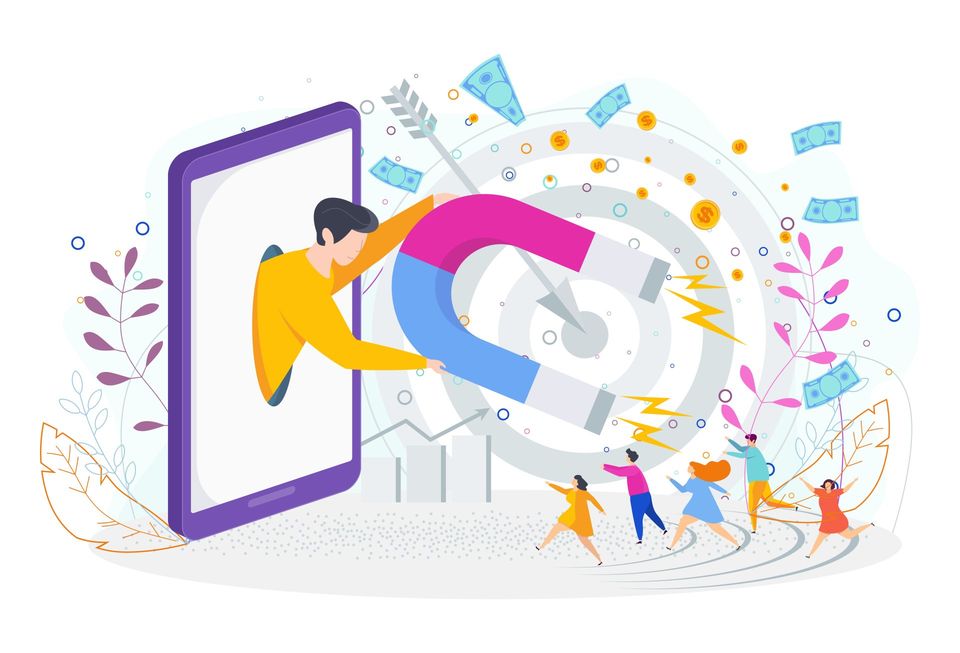Top funnel building software resources
If your sales funnel isn’t working quite as well as you would like, it could be that you aren’t using the right software.
And that wouldn’t be your fault. There are so many choices out there, and they won’t all work the way you would like them to work for your business.

- Awareness – when someone visits your website for the first time, after a Google search, clicking on an ad or responding to a post on social media
- Interest – your business can offer the solution to a visitor’s problem, so they subscribe for your email list and/ or follow you on social media
- Decision – a prospective customer is weighing up what you have to offer, before making a final decision about whether to buy
- Action – the prospective customer clicks on the purchase button and becomes a customer
Awareness: Artwork creation
The top of your sales funnel could be your social media, your ads or even a glossy, printed brochure. To get someone interested in your products or services, you need to attract their attention with a strong brand identity. To create artwork which is consistent across your brand, but without spending a fortune on a designer, you need good artwork creation software.
For this, we would recommend Crello https://crello.com/home and Artboard Studio https://artboard.studio/
- Graphic and video design tool which works in a few clicks
- Over 25,000 still and 9,000 video design templates
- Design formats especially for Facebook, Twitter, Instagram and YouTube
- Access to 70 million stock photos
- Create easy animations
- Great for print – including flyers, business cards, posters and invitations
- Priced from free to $7.99 (£6.44) per month
- Create branding designs and update them across multiple projects
- Library of exclusive photos and templates
- Easy to use
- Easily share projects with team members
- Integrate with platforms from Twitter to MailChimp and more without downloading and uploading
- Priced $15 (£12) per month for the commercial license, with free access for charities and not-for-profit organisations
Interest: Creating lead magnets
A lead magnet is something extra you can offer through your website, in return for a visitor’s contact information. They include things like ebooks, videos and webinars, and are a really effective way of getting those valuable email addresses. They are a tried-and-tested way of converting more traffic into leads.
Few people can resist something extra for free – it’s called a ‘magnet’ because it attracts people.
So you need to be sure that the lead magnets you are creating really will attract your visitors to sign up. For this, we recommend Google Slides https://www.google.co.uk/slides or Beacon https://beacon.by/
- Free to use
- Wide variety of easy to use themes, templates and fonts
- Available to access from any device at any time
- Saves changes automatically as you type
- Can be worked on by a whole team
- Specialised lead magnet solution
- Helps you create beautiful lead magnets without a designer
- Easy to use
- Professional templates which you can customise for your brand
- Automatically converts a blogpost into a lead magnet format
- Integrates with the most popular email marketing and blogging platforms
- Priced from free for beginners up to $99 (£79) per month for the ‘agency’ package
Interest: Email marketing software
Email marketing is an essential part of your sales funnel – whether someone is considering a first purchase or coming back to your site as a regular customer. The potential ROI on email marketing is high – and it’s even higher if you can send the right emails to the right people at the right time, rather than relying on bulk campaigns which won’t appeal to everyone.
For the very best email marketing software, we recommend MailerLite https://www.mailerlite.com
- Easy to build professional emails with no designer or HTML skills required
- Delivers personalised messages with advanced targeting campaigns
- A/B testing to ensure your emails are as effective as possible
- Tracks your performance to find out what works best for your business
- Offers 24/7 live chat support
- Priced from free for up 1,000 subscribers and 12,00 emails per month and $50 (£40) per month for 5,001 to 10,000 subscribers and unlimited emails
Decision: Popups and form embeds
There are two types of popups – really annoying or really effective. Obviously, you want to be using the effective type! Convertbox https://convertbox.com is a step ahead of other software – driving more leads and sales with personalised messages delivered at the right time.
Ready to launch soon, you can request early access and lifetime pricing now.
- Easy to edit and customise to match your brand
- Choice of on-site messages and notifications in a few clicks
- Collects the data you need with custom lead capture forms
- Segments your audience to deliver highly personalised offers specific to their interests
- Easy to carry out A/B testing to quickly learn what works best for conversions
- Embeds your favourite tools to show videos, add checkout software, connect with messenger bots and more
Action: Checkout software
The checkout page is the most important part of the sales funnel, but it is also where up to 40% of potential customers are lost, due to confusing or badly designed pages.
ThriveCart https://thrivecart.com not only improves your basket and checkout to prevent these lost sales, it can actually boost sales by persuading customers to buy more from you at the last minute.
- Easy to set up with no knowledge of coding required
- Offers beautiful checkout pages with features that increase the value of every visitor to your site
- Includes hard-to-refuse ‘bump’, upsell and downsell offers at checkout
- Integrates seamlessly with a large range of software you already use on your site
- Good value for money - priced at $495 (£396) for lifetime access
Action: Course software
Offering online courses and training – either paid or free of charge - is relevant to most B2B companies and is a fast-growing business. In fact, online learning is expected to reach $325 (£260) billion by 2025.
Whether you are a web designer offering web training course, an architect helping clients to plan their developments or just someone with a passion for a topic who wants to share their knowledge, the right course software can make it work for you.
For software that doesn’t just create a course, but helps you build your business and brand, we recommend Teachable https://teachable.com
- Easy to link to your website with a custom domain
- Integrates with a huge range of platforms
- Offers live one-to-one or groups sessions
- Course compliance controls that require completion before moving on
- Easy to create sales pages
- Range of pricing and payment options
- Priced at $99 (£80) per month for the most popular plan
Entire funnel: All-in-one software
Sometimes you don’t need multiple types of software and a variety of different platforms to do the job for you. All-in-one sales funnel software includes multiple functions from courses emailing to taking payments, courses and more.
These tools will help you run an effective sales funnel to optimise conversions without the need for a team of web developers and designers.
The best all-in-one funnel software platforms we’ve come across are Kartra https://home.kartra.com/home and InfluencerSoft https://influencersoft.com
- Easy to use page builder with a choice of hundreds of templates, which can be integrated into the right part of your funnel
- Builds a complete funnel with automations, emails, segmented prospects and more
- Keeps track of your leads – from what they have subscribed for to what they have bought and which emails they have opened
- Easy to create personalised emails based on your visitors’ behaviour
- Recruits, manages and tracks affiliates
- Optimised checkout pages suitable for selling both digital and physical products
- Priced from $99 (£79) per month, with the most popular package priced at $199 (£159) per month
- An entire funnel from strategy to branding, content and automation
- Choice of funnel templates for different products and services
- Tracks funnel to determine where to make improvements
- Automated emails segment subscribers based on their actions
- Attractive and responsive payment pages include different payment plans and upsells and downsells
- Includes affiliate platform
- Priced at $997 (£798) for lifetime access
More Posts.












